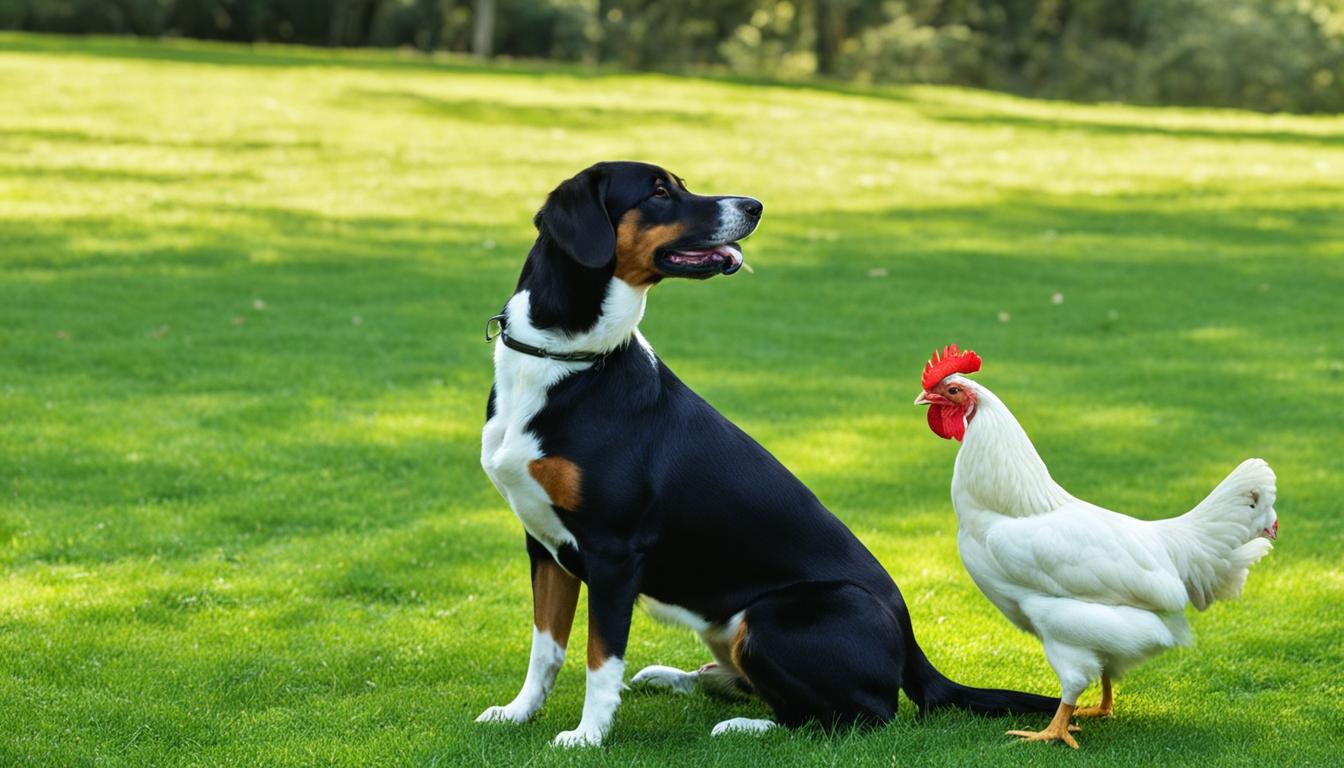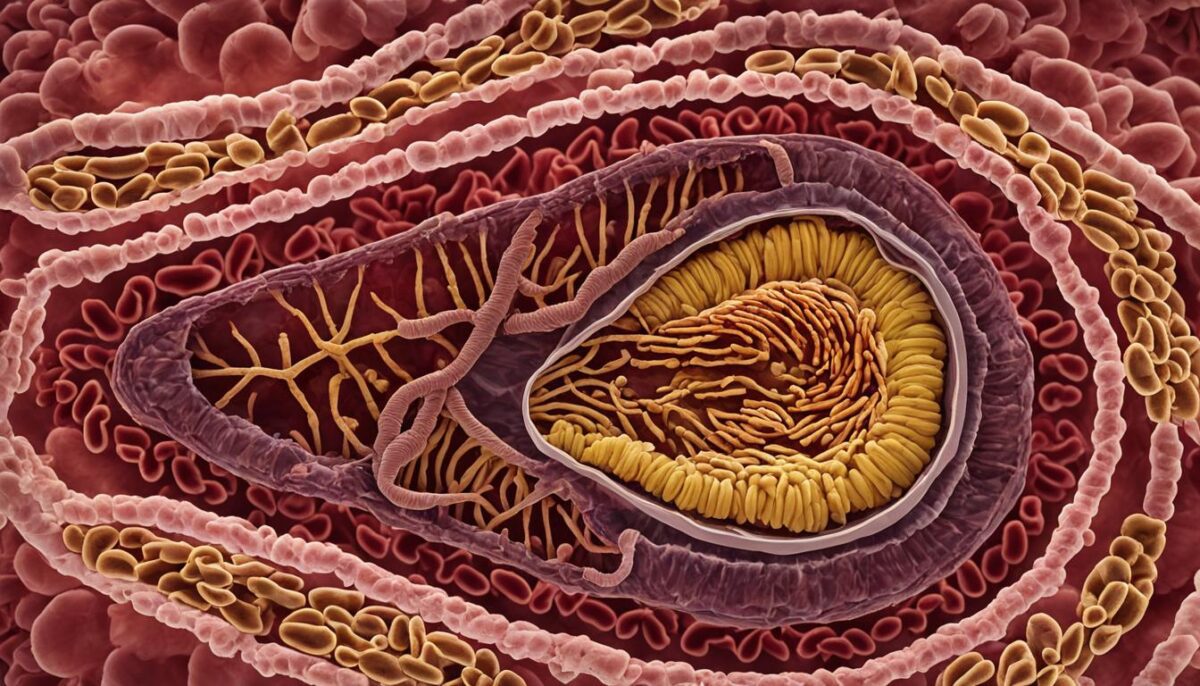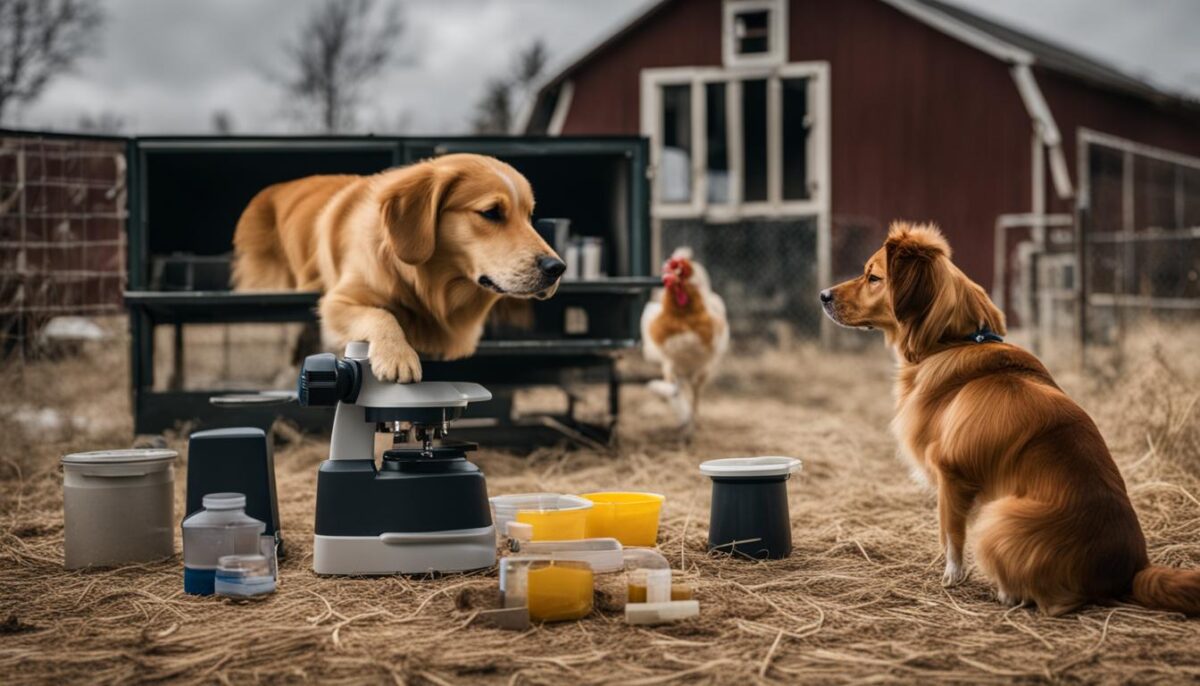Do you have a dog and chickens living together? You might wonder if this is safe for your dog’s health. Coccidia is a tiny bug that can make dogs sick. But here’s some good news: dogs can’t catch it from chickens. That’s because coccidia in dogs and coccidia in chickens are different.
Even though dogs can get sick from these parasites in dogs, playing with chickens is not a worry for coccidia. Still, keeping your dog away from where the chickens hang out and their poop is smart. Keeping things clean helps stop your dog from getting sick from other things.
If dogs and chickens meet, it’s important to train the dog. Make sure they know how to be calm and friendly around the chickens. Also, always watch your pets when they are together. Never leave them alone without you there to check on them.
Key Takeaways
- Dogs can’t get coccidia from chickens because the bugs are not the same.
- Keeping dogs and chickens apart, especially their living areas, is a good idea for your dog’s health.
- Always watch your dog when it’s near chickens to make sure they are safe and happy together.
- Regular cleaning can protect your dog from getting sick from other harmful things.
- Teaching your dog to be nice to chickens is important for everyone’s safety.
Understanding Coccidia in Dogs and Its Sources
Coccidia are teeny-tiny bugs that can make your dog feel yucky. They live in the belly and could make your furry friend have runny poop or an upset tummy. Sometimes, dogs might even lose weight or not want to drink water, which can be dangerous. Let’s learn more about these bugs and how they can hitch a ride to your dog.
Defining Coccidia in Canines
Coccidia in dogs are a type of protozoan parasite that cause trouble inside a dog’s belly. These parasites can lead to something called intestinal infections in dogs. Puppies, in particular, can get sick from coccidia because they’re still growing strong bodies to fight off bugs like these.
Distinguishing Coccidia among Different Animals
Here’s something interesting – not all animals share the same coccidia. These bugs are host-specific parasites, which means the type that can live in dogs usually won’t live in other animals like sheep or cats. This also means your dog can’t catch these bugs from or give them to these animals. Each animal has its own coccidia species!
Common Transmission Routes for Canine Coccidiosis
How do these tiny buggers move around, you ask? Well, the main way dogs get coccidia is through the fecal-oral route. That’s a fancy way of saying that dogs pick up these parasites by eating or licking stuff that came in contact with poop from sick dogs. This could be dirt, water, or even something filled with germs from a contaminated environment. To stop this, it’s super important to keep where your dog plays and eats nice and clean.
Ways to Say “No Bugs Allowed!”
- Always clean up after your dog — bye-bye, poop!
- Keep your dog’s play area tidy.
- Give your dog’s belly a health check-up.
Hugs and belly rubs are great, but nothing beats keeping your dog healthy. Understanding these bugs helps you to protect your furry best friend. Let’s make sure they stay happy and bug-free!
Can Dogs Get Coccidia from Chickens?
Do you have a dog and chickens too? You might wonder if they can get each other sick. Good news! Dogs and chickens can’t pass coccidia to each other. This is because the coccidia transmission is specific. That means the kind of coccidia in poultry doesn’t make dogs sick.
Your furry friend could play with the chickens and be just fine. Even though people could worry about cross-species infection, it’s not a problem here. Dogs have a different kind of coccidia than the kind that chickens have. So, when your dog is out there, having fun with the chickens, there’s no need to stress over coccidia. They’re safe from each other’s bugs!
Always remember to keep both your dog and your chickens’ homes clean. This is a good way to make sure everybody stays happy and healthy. And always check with your vet if you have worries about your pets getting sick.
Keeping Your Pets Safe: Disease Control for Dogs and Chickens
Hey there! Want to make sure your furry friend and your feathered pals stay healthy? It’s all about keeping their homes clean and giving them the right food. Let’s dive into some easy tips to help you keep disease away from your pets.
Benefits of Environmental Management
First off, cleaning where your pets live is super important. Did you know that a nice, clean space can help stop diseases from spreading? Yeah, it’s true! By cleaning up their living areas with steam or a mix of bleach and water, you can zap those pesky coccidia eggs right away! Also, remember to scoop up any poop as soon as possible. This helps your pets not get sick again. Easy, right?
Always remove poop quickly to reduce the risk of disease among your pets. It’s a simple step that makes a big difference in their health!
The Role of Nutrition in Disease Prevention
Now, let’s talk about food! Eating the right stuff can help your pets fight off sickness. For your chickens, good-quality grub means they’re feeling fine, which is also good for your doggo. Oh, but make sure your doggie doesn’t munch on chicken food, okay? It could have medicine that’s not meant for them. Keep dog food away from the chickens, too. Having separate spots for their meals and water keeps those germs from hopping between them.
So, follow these simple feeding practices:
- Give your chickens food that’s just right for them.
- Keep dog food out of reach from your feathery friends.
- Set up different places for eating and drinking for each pet.
Stick to these and you’ll be a champ at pet nutrition and disease prevention!
| Task | Dogs | Chickens |
|---|---|---|
| Clean living space | Daily with pet-friendly cleaner | Regularly with bleach solution |
| Remove waste | Immediately | As soon as spotted |
| Food practices | Keep away from chicken areas | Offer quality feed, no dog access |
| Parasite prevention | Monitor for signs, clean up | Clean coop, proper sanitation |
Keep these tips in mind and you’ll help your pets stay happy and healthy—free from worrisome bugs and yucky diseases. They’ll thank you with lots of tail wags and happy clucks!
Recognizing and Responding to Coccidia Infections in Dogs
When your furry friend starts to act sick, it’s important to know what signs to look for. Coccidia is a tiny bug that can cause problems in your dog’s tummy. If your dog has watery poop, isn’t eating much and seems very thirsty, or is even throwing up, these could be signs of coccidiosis.
Symptoms of Coccidiosis to Watch For
Your dog might have dog diarrhea, which can be a sign of coccidia. Keep an eye out for health symptoms in dogs like your pup feeling tired, not wanting to eat, or losing weight. Even if your dog seems okay, sometimes they might not show that they’re not feeling well. That’s why you should look out for these things!
When to Consult a Veterinarian
If you see any signs that make you think your dog is under the weather, it’s best to plan a vet visit. Vets are smart and they know just what to do to figure out if your dog has coccidia. They might look at your dog’s poop under a special tool called a microscope to make a coccidia diagnosis.
Treatment Options for Coccidiosis in Dogs
If your vet finds coccidia in your pup, they will help you to make your dog feel better. There are medications for dogs that only your vet can give you. One medicine called Sulfadimethoxine can help to get rid of the coccidia bugs. Your house needs to be super clean as well. This helps stop other pets from getting sick and supports parasite eradication.
Preventive Measures: Protecting Your Dog from Parasites
Keeping your dog healthy and happy is important. To do this, you need to make sure their space is clean and they see the vet for check-ups. Let’s talk about some of the best ways to stop your dog from getting sick from little bugs like coccidia.
Maintaining Clean Living Spaces
Cleaning and hygiene are key to a safe dog environment. Always pick up your dog’s poop right away. If needed, you can also use water with a little bit of bleach to clean the ground. This helps stop bad bugs from staying around and making other dogs sick. Remember to wash your hands after, so you stay safe too.
Importance of Regular Veterinary Check-ups
Going to the vet is really important for your dog. A vet can do health screenings for dogs, which help find little bugs that make them sick. If your dog has runny poop or even if they seem okay, a vet can check their poop. Taking your dog for a check-up every year is a good way to use preventive health measures to keep your dog feeling great.
By following these steps, you stop your dog from catching bad bugs. Always keep your place clean and visit the vet. This way, your dog can run and play and be a happy pup!
Conclusion
It’s great to learn that your furry friend can’t get coccidia from chickens. Keeping your dog protected against this unkind bug means being good at cleaning, giving them healthy food, and seeing the vet for regular check-ups. This is part of being a caring and responsible pet owner.
Remember to strengthen your coccidia awareness. Always watch out for your dog’s health by keeping their home neat and tidy. If you see any mess, clean it up fast! This stops a lot of bugs from making your dog sick.
Finally, always keep learning about pet health education. It helps you take better care of your dog. By being a responsible pet owner, your dog can stay happy, playful, and full of good health!
FAQ
Can dogs contract coccidia from chickens?
No, dogs cannot contract coccidia from chickens. Each species has its own type of coccidia that is not typically transferable to other species.
What is coccidia in dogs?
Coccidia are small parasites that can infect the intestinal tract of dogs, leading to symptoms like diarrhea, abdominal pain, weight loss, and dehydration.
Are coccidia species-specific?
Yes, coccidia are host-specific parasites. The type that affects dogs will not normally infect chickens, cats, or humans, and vice versa.
How do dogs get infected with coccidia?
Dogs typically get infected with coccidia through fecal-oral transmission, by ingesting the coccidia eggs from contaminated soil or feces.
How can I prevent coccidia transmission between my pets and their environment?
Keeping your pets’ living environment clean, including regular removal of feces, and maintaining proper hygiene practices like steam cleaning or using a bleach solution, will help prevent coccidia and other parasites.
What role does nutrition play in preventing coccidia and other diseases in pets?
Good nutrition strengthens your pets’ immune system, making them less susceptible to infections like coccidia. It’s important to keep dogs and chickens on their species-appropriate diets to maintain their health.
What are the symptoms of coccidiosis in dogs?
Symptoms of coccidiosis in dogs can include diarrhea, weight loss, dehydration, increased thirst, and vomiting. However, some dogs may not show any symptoms.
When should I take my dog to the vet for coccidia?
If you notice any symptoms of coccidiosis or suspect your dog might be infected, it’s essential to consult a veterinarian promptly for diagnosis and treatment.
What does treatment for canine coccidiosis involve?
Treatment usually involves specific medications like Sulfadimethoxine prescribed by a vet, along with thorough cleaning of your dog’s environment to prevent the spread or recurrence of the infection.
How important are regular vet check-ups in preventing coccidia?
Regular veterinary check-ups, including fecal screenings, are crucial for early detection and prevention of coccidia and other parasites, even if your dog seems healthy.
What can I do to maintain a clean living space for my dog to prevent coccidia?
Regularly clean up feces, disinfect your dog’s living area with appropriate cleaners, provide clean food and water dishes, and prevent access to potentially contaminated environments.


